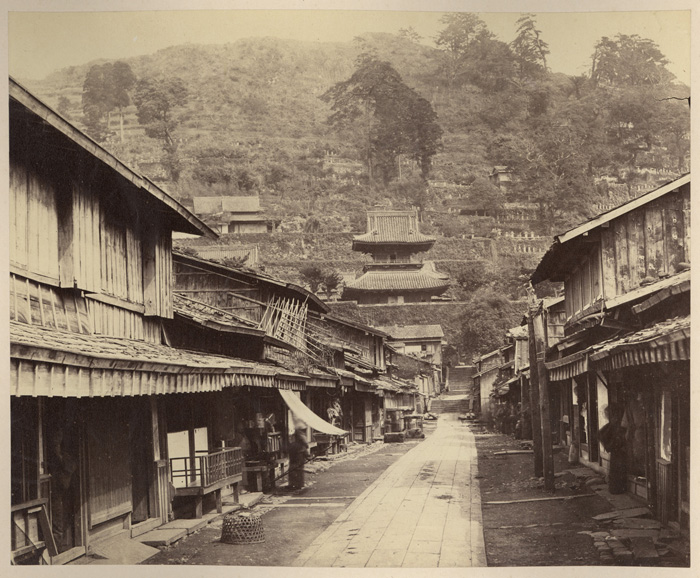
Within a decade of its founding, the Massachusetts Agricultural College began to forge what would become fast ties with its counterparts in Japan. Seeking to establish a thoroughly modern college in Hokkaido, the Imperial Government in Japan looked to America for a model of innovation in agricultural education, settling quickly on MAC. With the leadership of William Smith Clark, a succession of faculty, students, and alumni helped develop the Sapporo Agricultural College (now Hokkaido University).
The Dept. of Special Collections at UMass Amherst (SCUA) houses several collections from those early exchanges, including the papers of William Smith Clark and his students and colleagues William Brooks and William Wheeler, along with the remarkable collections associated with the geologist Benjamin Smith Lyman, a resident of Northampton. These collections have formed a core on which SCUA continues to build. Today, the department specializes in documenting the American study of Japanese history and culture, particularly in the post-war period.
Selected collections
- Beato, Felice. Papers, ca. 1863-1871.
- As a photographer, Beato was an important chronicler of late-Edo and early-Meiji era Japan.
- Brooks, William Penn. Papers, 1863-1939.
- Invited by the Japanese government — and his mentor, William Smith Clark — to help establish the Sapporo Agricultural College, modeled on the Massachusetts Agricultural College. Spending over a decade in Hokkaido, Brooks helped to introduce western scientific agricultural practices and the outlines of a program in agricultural education, and he built a solid foundation for the School.
- Clark, William Smith. 1814-2003 (bulk: 1844-1886).
- Held the presidency of Massachusetts Agricultural College (now University of Massachusetts Amherst) from 1867-1879, and helped to found Sapporo Agricultural College (now Hokkaido University) in Japan in 1876.
- Lewis, Gertrude. Papers, 1920-2001.
- An educator for most her life, Lewis ‘s papers document changes within theory and pedagogy over time and in various geographic locales, including Japan, in the field of education.
- Lyman, Benjamin Smith
- Papers, 1831-1921. Prominent geologist and mining engineer, Lyman was invited by the Meiji government in Japan to help introduce modern geological surveying and mining techniques during the 1870s and 1880s.
- Japanese Book Collection, 1710-1898. During his years as a consultant to the Meiji government in Japan, Benjamin Smith Lyman accumulated a large collection of books printed in Japan. His book collection includes works on language to literature, religion, the arts, and culture.
- Maki, John. Papers.
- Japanese-American professor of political science at UMass who worked on contemporary Japan, militarism, and post-war constitution. Maki served in U.S. Army Intelligence during the Second World War, and spent several months in Japan in 1946 as part of the Occupation administration.
- Passin, Herbert. Collection, 1944-1955.
- Inducted into the Army in 1941 and assigned to duty in Tokyo in December 1945, he became chief of the Public Opinion and Sociological Research Division under Gen. Douglas MacArthur. During his tour of duty, Passin coordinated a series of sociological studies of Japanese village life to help guide U.S. Occupation policy, particularly as it dealt with land and labor reform.
- Stockbridge, Levi. Papers, 1841-1878.
- Pioneering agriculturist and president of Massachusetts Agricultural College, whose son, Horace Edward Stockbridge, taught at Hokkaido University and sent descriptions of his travel in Japan home.
- Totman, Conrad. Papers, 1800-2005.
- A professor of Japanese history at Yale, Totman’s collection a treasure trove of information on Japan in general, and particularly on his specialties: early modern Japan and forestry and environmental management.
- Wheeler, William. Papers, 1876-1930.
- Joined Massachusetts Agricultural College President William Smith Clark and two other alumni of the college in helping to found the Sapporo Agricultural College in Japan (now Hokkaido University), succeeding Clark as president of the school from 1877 to 1879.
- Yamashita, Yoskiaki. Photograph album, ca. 1904.
- Professor from Tokyo who traveled the United States providing instruction in the new martial art of judo from 1903-1960.

